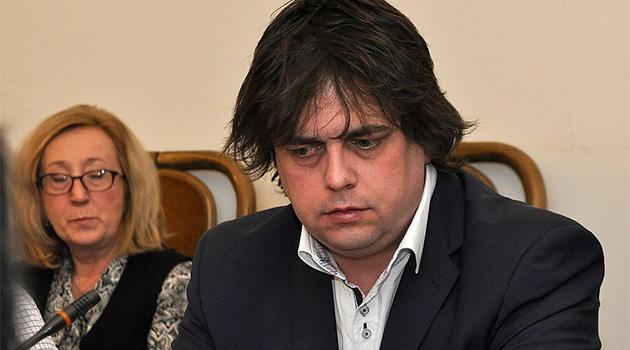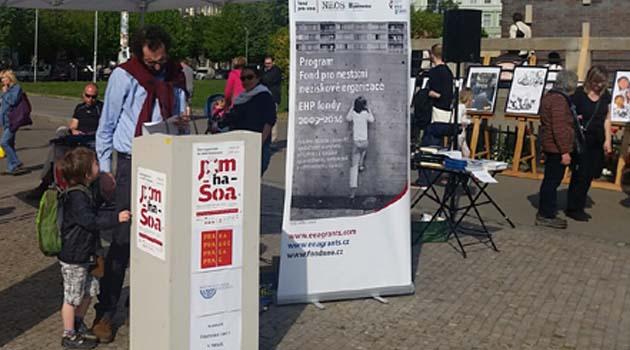Czech ex-lawmaker gets six months, suspended for one year, for his remark about the WWII-era concentration camp for Roma at Lety u Písku

A Czech court has punished former “Freedom and Direct Democracy” (SPD) MP Miloslav Rozner for the statement he made about the WWII-era concentration camp for Romani people at Lety u Písku by sentencing him to six months in prison, conditionally suspended for one year; according to the prosecutor, Rozner committed the crime of doubting genocide in 2017 when he described Lety as a “non-existent pseudo-concentration camp”. The former MP rejects the charges and claims to have just been criticizing the decision of the administration to spend approximately CZK 372 million [EUR 15 million] (before VAT) to buy out the pig farm that was built over the site of the former concentration camp there after the war.
The verdict was handed down on 25 April and has yet to take effect. According to Judge Helena Strnadová, Rozner’s defense was tendentious and unbelievable.
“If he had actually wanted to criticize a disproportionately high purchase price, he could just have talked about the cost, about the dry, economic facts,” the judge said. According to the indictment, Rozner made his statement in December 2017 at the SPD Congress, criticizing the decision of the coalition government of ANO, the Christian Democrats (KDU-ČSL) and the Czech Social Democratic Party (ČSSD) to buy out the pig farm.
“Yes, I am not such a cultural expert as ex-minister Herman, but I would never have thrown half a billion crowns out the window to close a functioning company because of a non-existent, pseudo-concentration camp,” the prosecution quoted Rozner’s 2017 speech. The prosecutor argued that Rozner’s statement publicly relativized the crimes of the Nazis and cast doubt on whether the ethnic Romani prisoners of the camp had suffered.
The proposal for the purchase of the pig farm was submitted by the Czech Culture Ministry, headed by Minister Daniel Herman (KDU-ČSL). Speaking in court in March of this year, Rozner rejected the argument that he had wanted to deny the Holocaust by making his statement.
The former MP argued that he had just wanted to point out that the purchase price of the pig farm was too high. In Rozner’s written statement on the indictment, which the judge read into the record before his testimony, the former MP said, among other things, that the word “non-existent” meant the camp no longer existed at the time of his speech, and that the concept of a “pseudo-concentration camp” referred to an expert opinion published by the Czech Academy of Sciences’ History Institute according to which the camp at Lety allegedly had not been a concentration camp.
Rozner added in his written testimony that he is aware prisoners died in the camp and that he is sorry for each and every victim. According to prosecutor Michal Bušek, however, Rozner’s 2017 statement had not been impelled by a desire to engage in a debate about history, but had been a populist statement.
According to the prosecution, the term “concentration camp” does not just refer to camps where people are murdered, but also to camps where they are imprisoned. The purpose of Rozner’s remark was to belittle the suffering of the people affected by the Holocaust, the prosecutor said in his closing argument.
Defense attorney Pavel Martiník reiterated in his own closing argument that Rozner had never wanted to cast doubt on genocide, just to draw attention to the decision by the Government to buy out the land on which the former camp had been located. “Once again, I emphasize that I do not deny and I am not making light of the Roma Holocaust, and that I have never made any statement intending to deny or make light of it,” Rozner told the court on 25 April.
Police had wanted to charge Rozner in 2018, but he had parliamentary immunity and the lower house decided not to strip him of his immunity from prosecution. Last October, Rozner lost re-election and therefore his immunity.
From the history of the concentration camp at Lety u Písku
At Lety u Písku in the Protectorate of Bohemia and Moravia (16 March 1939 – 8 May 1945), the area where the concentration camp would one day exist originally served in 1940 as an accommodation facility for construction workers. It then became a disciplinary labor camp upon the order of Interior Minister Josef Ježek, on 15 July 1940, issued on the basis of Czechoslovak Government Decree No. 72 on disciplinary labor camps, dated 2 March 1939.
The disciplinary labor camp decree had been issued before Czechoslovakia was occupied by the Nazis. It stipulated that the persons who were to be concentrated in disciplinary labor camps were “able-bodied wandering gypsies and other vagabonds living that same way, beggars by occupation and people who make their livings from the begging of others (children, etc.), professional gamblers, notorious bums, good-for-nothings and people who make their livings from dishonest earnings (prostitution, etc.), either their own or that of others.”
The first 20 prisoners arrived at the disciplinary labor camp at Lety on 17 July 1940. On 1 August 1942, it was transformed into a “Gypsy Camp”, after which entire families of Romani people were transported there.
The concentration camp at Lety began operations on 1 August 1942 and ceased operations on 4 May 1943. Its capacity was enlarged to accommodate up to 600 prisoners, but even that number was soon exceeded, because during August 1942 more than 1 100 children, men and women were imprisoned there.
The camp was not equipped with the necessary hygienic and other facilities for such a large number of people. The prisoners frequently had to bathe in a nearby fishpond.
Prior to August 1942, the camp had just been used to house male prisoners. As of August 1942, children and women were also brought there to rot in absolutely appalling conditions.
After the big intake of prisoners in August 1942, most of the rest just arrived at the camp as families or individuals. A total of 326 people died on the concentration camp grounds at Lety, of whom 241 were children.
An improvised burial ground was dug near the camp for 120 of the victims. However, some survivors say many more prisoners than that perished in the camp.
During their transport to Auschwitz, another 540 Lety prisoners died on the way. There were two mass transports to Auschwitz from Lety.
The first was on 3 December 1942, a transport of those called “asocials”, 16 men and 78 women, who were forcibly sent to the Auschwitz I Concentration Camp. The second transport, for all practical purposes, meant the camp at Lety was no more, because 417 prisoners were forcibly sent to the Auschwitz II-Birkenau Concentraion Camp.
The first transport from Lety u Písku to Auschwitz was undertaken on the basis of a crime prevention decree, but the second was undertaken on the basis of a decree handed down by Reichsführer of the Schutzstaffel (Protection Squadron – SS) Heinrich Himmler on 16 December 1942, which ordered all Romani people transported to the Auschwitz Concentration Camp. The remaining 198 prisoners were moved to the “Gypsy Camp” at Hodonín u Kunštátu (called Žalov) or to detention camps in Pardubice and Prague.
